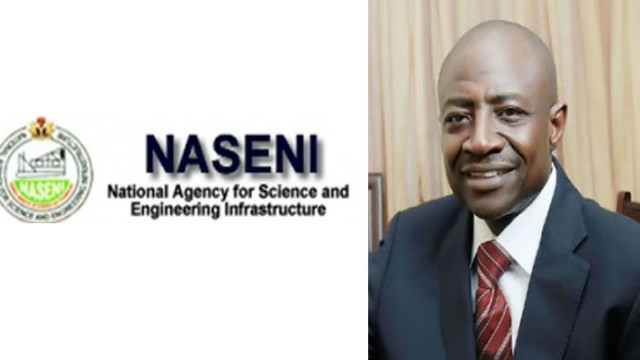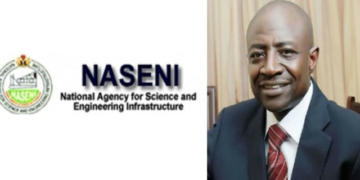Before May 2015, there was a unanimous consensus among Nigerians that the country had slipped into very dangerous abyss of ennui, where virtually all public institutions and agencies collapsed pathetically, amid mounting problems.
Therefore, President Buhari ascended the Presidency of Nigeria on the banner of a reformer and redeemer, with a vow to change the narrative positively.
And frantically, all civilized nations assume the status through the development and promotion of science and technology. However, its application in Nigeria was not only abandoned, but regrettably disappeared from the binoculars and psyche of national planners or policy makers. President Buhari’s retention of the Ministry of Science and Technology, after trimming down the number of ministries sent his signals to pull back Nigeria from this regressive obscurity of Science and technology in national life.
Hitherto, some federal agencies like the National Agency for Science and Engineering Infrastructure (NASENI) were cold- dead agencies, which existed only in nomenclature and a huge staff base. NASENI, with a gargantuan mandate ought to have been the bedrock of the development of science and technology, failed to register its presence in tackling the multifaceted challenges of a technology-driven economy of Nigeria.
But the mindset and focus of Mr. President has rejigged the tale. And in NASENI specifically, an agency mandated to provide engineering infrastructure to effectively service the nation’s technological needs in consumables’ has attuned into the “change mantra” code.
The last two years have ingrained silent ineradicable footprints in bravura development of home-grown technology, spanning many sectors. The awe-inspiring breakthroughs are already transforming the lives of Nigerians in some communities. Surprisingly too, the agency has its eyes eagerly fixed on erecting a platform of launching Nigeria into the prestigious clan of technologically endowed countries of the world soonest.
Nigeria’s glorious songs in technological advancement have been ennobled by NASENI’s Executive Vice Chairman and Chief Executive, (EVC/CE), Prof Mohammed Sani Haruna and his team. They are quietly exploring the several windows abound in the agency to redesign the face of Nigeria in the application of its indigenous knowledge of science and technology to provide solutions to national problems.
And in the last couple of years, even with little resources at his disposal, Professor Haruna’s innovations in research and development, commitment and unyielding exploration of fresh grounds have posted confounding results. It has surged NASENI, a once decrepit agency into national cum international limelight, with breathtaking technological inventions and creativity, which are proudly Nigerian.
An archetypal, professional engineer cum administrator per excellence, Prof. Haruna, has dramatized his ingenuity in leadership of the agency, in consonance with President Buhari’s leadership of Nigeria. Buhari , who is the Executive Chairman and doubles as chairman, Governing Board of NASENI .
The EVC/DG has placed the agency and its dozen institutes, perpetually on a fast rewarding lane of productivity as exposed in this interview that “NASENI has continued to design and fabricate products that have bettered the lives of Nigerians and also transferred these technologies to SMEs.”
Like President Buhari, Professor Haruna unmistakably blends words with action and the vaults of NASENI under the few years of his leadership display admirable and fascinating treasures in indigenous technology. An ardent apostle of the Executive Order on Local content, the EVC has struck partnerships and synergies with local partners in enhancing the work of the agency.
He has leveraged on the commonplace technological void, which afflict Nigerians, but attract huge foreign exchange expenditure to deliver his message of emancipation to Nigerians. The agency’s shadows now roam splendidly in power, industrial, education, agriculture, transport sectors as well as in mechanical re-engineering of the electronic voting system.
It is to NASENI’s credit that some Nigerian communities now regale in micro-power generation liberty with the development of locally researched and produced Small hydropower (SHP) Propeller Turbines of three different models. The brainchild of the Engineering Materials Development Institute (EMDI), the Turbines are already effectively supplying 10 KW electricity to communities, like the Awara Dam facility in Ikare, Ondo state.
To demonstrate his leadership prowess, NASENI under Haruna has crazily romanced technology in many novel ways. The Ikeji-ille Ijesa community in Osun state is powered by the agency’s Cross Flow Turbine , which generates up to 70 KW of electricity. And likewise, the Mada Community at Gudi hamlet, in Nasarawa state has continued to celebrate a 5 KW Kinetic Turbine installed for power supply.
And further deconstructing the underbelly of hydro-power generation in Nigeria, NASENI has also developed a 10 KW Propeller Turbine, whose capacity to generate power is merely pressure from a pipe -borne water source.
But with eyes set on long targets, Professor Haruna has reactivated and upgraded the 5 MW Solar panel manufacturing plant at Karshi, Abuja and converted into a limited liability company renamed as NASENI Solar Energy Limited (NSEL). At the moment, NSEL produces solar panels and modules for Nigerians. It has also developed a high voltage testing laboratory, a vital component or unit for all power generation companies.
And by 2019, through a partnership with a firm in China, its capacity is planned to jerk up to 25MW and, an increased local content targeted to jump from 40- 95 percent, to land a mass production of cheaper solar panels and power transformers for domestic uses and exportation to other African nations.
The agricultural sector, which is another prime sector President Buhari has targeted for attaining food security and self-sufficiency, in the bid to diversify Nigeria’s mono-economy, NASENI has registered imprints. Professor Haruna has actualized the development of efficient Deep Well hand pumps and centrifugal pumps for irrigation purposes in the pursuit of all-year farming agenda of Nigeria.
Through the technique of reverse engineering, the agric sector is also infested with other goodies, as farmers can now boast of mobile cassava graters, rice threshers and harvesters, yam pounding machines, fish dryer, table top seed oil mills for easy extraction of oil from various genetic seeds.
However, NASENI has pleasantly shocked Nigerians by pioneering the development of first made- in Nigeria passenger and cargo tricycles with improved features. These are low cost vehicles, and designed for the convenience of rural dwellers, intended to solve the haunting problems of haulage of agric produce from rural areas to urban market centers.
It like, the EVC has a knack for scoring first. So, the Haruna led agency has also produced the first made- in Nigeria motorcycle, with 65 percent of its components locally sourced. And plans are in top gear to commence mass production anytime from now.
Nigeria’s industrial sector is experiencing a blaze of glorious moments and products. NASENI has launched multiple mud brick making machines and Injection nozzles. it is producing machine components/spare parts and molds, which has sent a message to the outside world that the indigenous importation racket would soon be broken. Added, there is NASENI engineered Laterite Grinders as well as Laterite Mixers, whose proficiency is comparable to foreign ones and a lot similar interventions in the offing.
And in order to vacate the perennial problem of electoral malfeasances prevalent in Nigeria and Africa generally, through credible polls, a unique solar-powered electronic voting machine (e-voting machine) has been developed. It has cloud-based collation of election results devices anywhere. Some, other outstanding features of the e-voting machine ensures and guarantees all segments of elections on the same day and time, much as conveying electronically, flawless or indisputable results.
These days, national agencies and institutions like the Nigeria Airforce (NAF) have found NASENI convenient a destination for personnel and technicians training in networking tools and techniques in line with the Executive Order on local content for goods and services. This was impossible in the past, as foreign trainings would have usurped such roles for lack of a suitable, viable and functional internal agency like NASENI to render such services.
It is therefore, pertinent to buttress that Professor Haruna’s leadership of NASENI is configured after President Buhari’s mindset and actions in tandem with the “change mantra.” To understand that despite the poor funding of the agency, he has been able to promenade the agency on the path of unprecedented development is commendable.
Nigeria is craving for the sort of quality and focused leadership offered by Professor Haruna as the helmsman of NASENI. Its quite amazing that the results as manifest in work done is far beyond the limits of federal resources at its disposal. It again, trumpets Buhari’s message of inward search for solutions to Nigeria’s problems by the different heads in the lower rungs of leadership.
No wonder, this devout and result-oriented leader, has earned the confidence of the Honorable Minister of Science and Technology, Dr. Ogbonnaya Onu, another scientific guru. He has entrusted Professor Haruna with chairmanship of various committees in the ministry to illuminate the path of development in science and technology for Nigeria.






Discussion about this post